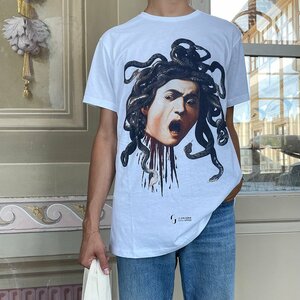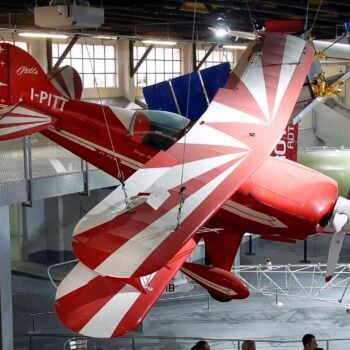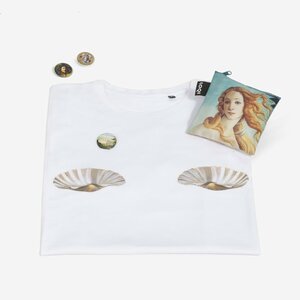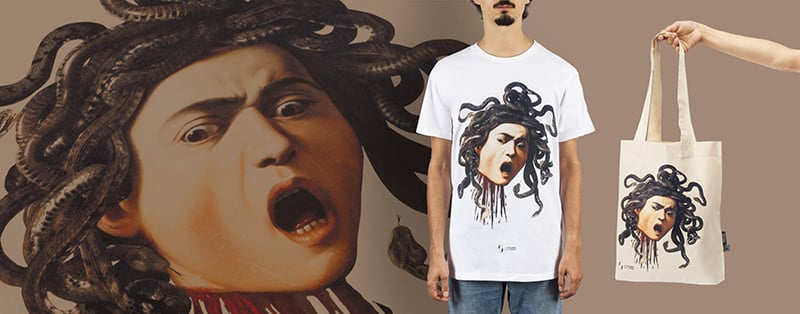All the articles
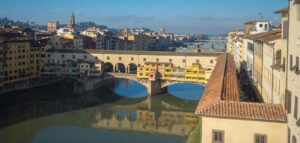
The Corridoio Vasariano: a striking elevated passage through history and the cityscape of Florence
Unprecedented, accessible and spectacular, the Corridoio Vasariano reopened to the public in late 2024 after an eight-year restoration that now allows visitors to walk the entire length of this historic passageway: 750 covered metres linking the former Medici residence of Palazzo Pitti with the seat of government, Palazzo Vecchio.
The brainchild of Giorgio Vasari, the “passetto fiorentino”—as it was known at the time of its construction—offers visitors a truly unique experience. Here’s what to expect.
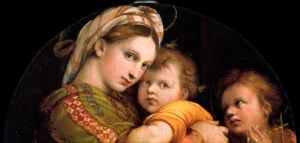
Raffaello’s Madonna della Seggiola, a masterpiece of rare familial intimacy housed in Palazzo Pitti
Displayed in the Sala di Saturno at Palazzo Pitti is one of Raffaello Sanzio’s most celebrated works: the Madonna col Bambino e san Giovannino, commonly known as Madonna della Seggiola. Set in an ornate seventeenth-century frame, the painting captivates for its deeply intimate tone – almost like a window into a tender moment of family life.
Still considered one of the Urbino master’s finest creations, little is known about its origins.
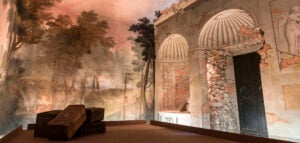
Casa Martelli: an immersive journey into the life of an ancient Florentine dynasty
To those unfamiliar with Florence, the name may not ring a bell. Yet the Martelli were a powerful noble family well known in the city
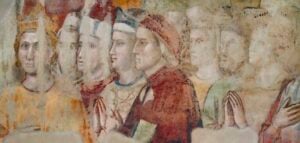
Dante at the Gallerie degli Uffizi: a journey through artworks inspired by the Supreme Poet
Few authors have inspired artists of the calibre of Giotto, Botticelli, Raffaello and Michelangelo as much as Dante Alighieri (1265–1321), still world-renowned for his Divina Commedia. A man of prose and poetry, Dante was forced to leave his native Florence due to political strife. Yet the city still preserves many traces of his enduring fame.
Like a modern-day Virgil, we will guide you through the halls of the Gallerie degli Uffizi to discover some of the most evocative works linked to the Supreme Poet and his words.
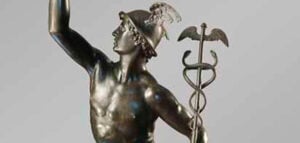
Giambologna’s Mercurio: an unrivalled icon of Florentine Mannerism
Determined, talented and tenacious, Giambologna – born Jean de Boulogne – is one of the leading figures of sixteenth-century Italy, and even today, anyone visiting Florence cannot help but admire his works. Among the most remarkable, celebrated and widely reproduced is certainly his Mercurio volante (1580, Florence, Museo del Bargello), now a true symbol of Mannerism and its daring formal balancing acts.
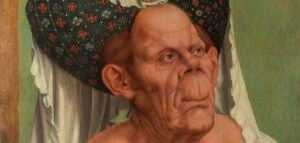
The beauty of ugliness: a fresh look at art between the 15th and 16th Centuries
Throughout the history of Western art, Ugliness has undergone a fascinating evolution. Initially viewed as a mere negation of beauty, it gradually acquired the status of an aesthetic category. This shift in taste and culture makes it even harder to define what is considered beautiful or ugly in art.
We’ve selected a few themes that highlight the concept of ugliness between the 15th and 16th centuries.
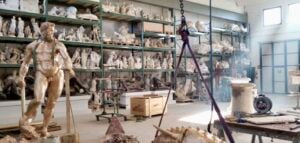
Florentine high craftsmanship: the historic Fonderia artistica Marinell
The story of the Fonderia Artistica Marinelli spans many years, built on ancient expertise and family traditions, where art and the highest Florentine craftsmanship merge to create one-of-a-kind works to admire and collect.
We spoke with its owner, Ferdinando Marinelli – grandson and namesake of the historic founder – to learn more about the foundry’s work, which still relies today on the fascinating 16th century technique of lost-wax bronze casting.
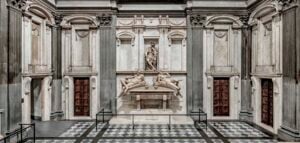
Sculpting space: discovering Michelangelo the architect
A supreme sculptor, an outstanding painter, Michelangelo was also an architect and writer – even though, by his own admission, he claimed he was neither. Yet he produced numerous verses in rhyme (published posthumously) and designed several buildings in both Florence and Rome. Many of his architectural projects were never even started, but among those that did take shape, we have chosen three that profoundly revolutionized traditional forms – an innovative spirit Michelangelo brought to every art form he mastered.
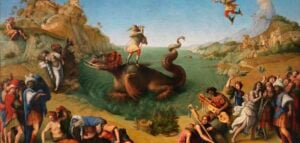
Greek mythology: stories of gods and heroes in painting and sculpture
From its earliest origins to the dawn of civilization and beyond, Greek myth has never ceased to captivate writers, philosophers, and artists. It survived Roman conquests, barbarian invasions, Christian reinterpretations, and more, arriving down through the ages largely thanks to the works of painters and sculptors who immortalized its stories. From the Renaissance onward, gods, heroes, and ancient figures reemerged, rediscovered and celebrated for their feats or their political, ethical, and moral significance. Let’s explore some of the most famous masterpieces dedicated to classical mythology.
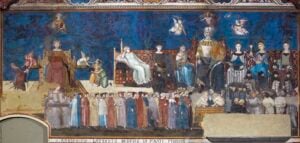
Allegoria del Buon Governo by Ambrogio Lorenzetti: a guide to interpretation
Between 1338 and 1339, the Sienese magistracy of the Nove (citizens chosen to administer the city) commissioned Ambrogio Lorenzetti (1290–1348) to paint the walls of the Sala della Pace in the Palazzo Pubblico, where government meetings were held. The result is a monumental cycle of frescoes, for a long time titled La Pace e la guerra but now known as L’allegoria del buon governo. It depicts the metaphor of just versus unjust government and their respective effects on the city and countryside: a remarkable political painting that has much to say, both symbolically and historically. Let’s take a closer look.
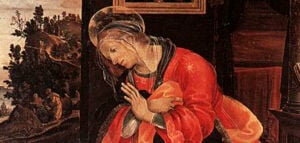
The Annunciation in painting: a journey through the most enchanting depictions from the Middle Ages to the Renaissance
The Annunciation is one of the most recurring themes in Christian art: since the 6th century, painters and sculptors alike have tackled the portrayal of this sacred scene, each in their own distinct way. In this article, we’d like to recall a few examples produced between the Middle Ages and the Renaissance that, thanks to their qualities or the innovations they introduced, stand out from all the others.

Achille Castiglioni’s life and works: innovation, functionality, and wit
When talking about Italian design, it’s hard not to immediately think of Achille Castiglioni and his brother Pier Giacomo. Both were award-winning architects and designers who, starting in the 1940s, created some of the most original projects on the Italian and international scene, producing objects still found in our homes and in museums around the world. To understand how much we owe to the Castiglioni brothers, and especially to Achille, let’s review his life and works with a focus on his industrial products.
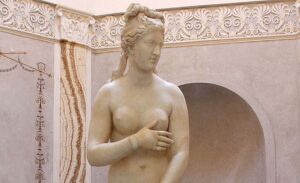
The nude through the centuries: from the Greeks to Tiziano in 5 masterpieces
The human body has always captivated artists, and depictions of nudity can be found as far back as antiquity. Yet their meaning shifts with evolving tastes, sensibilities, and social values. To better understand this progression, we have chosen five artworks where the nude plays a leading role – sometimes even boldly so – revealing the aesthetic and cultural standards of their time.
The Chimera di Arezzo: the Etruscan masterpiece of myth, art, and mystery
It was discovered on November 15, 1553, just outside the gates of Arezzo, during excavations for the construction of new city walls. It was rusted and dirty, its tail in fragments, two legs broken, and both eyes and jaws missing. And yet, there was no doubt: it was an Etruscan sculpture – and a magnificent one.
From the moment it was unearthed, the Chimera of Arezzo has sparked interest, admiration, and even a certain sense of awe. Today, it is kept in the Museo Archeologico Nazionale of Florence, where it continues to astonish and captivate visitors. Let’s find out more about this extraordinary historical artifact.
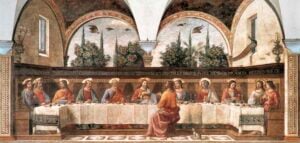
Beato Angelico and beyond: what to see at the Museo di San Marco in Florence
Located in the monumental complex of the Dominican convent, the Museo di San Marco houses the largest collection of works by Beato Angelico, who lived and worked here for many years.
But that’s just one reason to visit.
Inside, you’ll also find masterpieces by Fra Bartolomeo, Paolo Uccello, and Domenico Ghirlandaio, among others. Meanwhile, the building itself – designed by Michelozzo – epitomizes the formal and spatial harmony typical of early Renaissance architecture. A treasure trove awaits. Here’s what to see at the Museo di San Marco in Florence

Caricature: an art on the edge between satire and beauty
Ironic, exaggerated, sharp: caricature is, by definition, a controversial art form. The artist strikes where it hurts the most, the subjects portrayed are often offended, and the audience laughs. The history of caricature blends personal, social, and political aspects. In this article, we’ll explore its origins and development in Europe, focusing on some of its most significant figures.
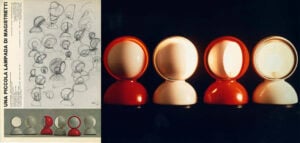
Vico Magistretti: life and works of an architect and designer awarded the Compasso d’Oro
World-renowned architect and designer Vico Magistretti (1920–2006) reinterpreted tradition with innovative materials and technologies, leaving an indelible mark on the history of Italian design – and beyond.
From the 1950s to today, his furniture designs have continuously adorned international homes and museums, defining new ways of living and understanding design.
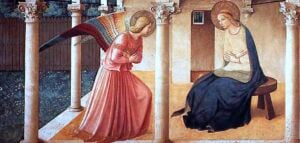
The Annunciazione by Beato Angelico at the Museo di San Marco, between Gothic and Renaissance
There are many aspects that make the Museo di San Marco in Florence a truly unique place. Originally established as a convent, it was partially secularized in the latter half of the 19th century when it was declared a national monument.
Inside, it now houses the largest collection of works by Beato Angelico – the friar-artist who lived and worked here for many years, creating an impressive cycle of frescoes. Among these, the Annunciazione – a recurring theme in his art – enchants viewers with its imposing yet refined simplicity, a true masterpiece of the early Renaissance.
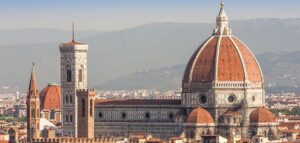
Brunelleschi’s dome: symbol of Florence and Renaissance architecture worldwide
An emblem of Florence, the dome of Santa Maria del Fiore towers over the city and, six centuries after its construction, still dazzles with its unsurpassed grandeur. Indeed, it remains the largest masonry dome ever built – a testament to the brilliance of Filippo Brunelleschi, a visionary architect with a fiery temperament.
At the time of its construction, few would have bet on the project’s success, which – according to Vasari¹ – nearly failed on multiple occasions…
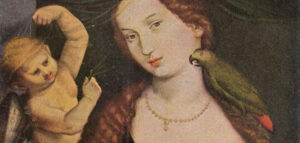
Dogs, cats and exotic species: animals in Renaissance art
A newfound interest in nature and the legacy of medieval symbolism are the keys to interpreting Renaissance paintings in which animals appear. The figurative art
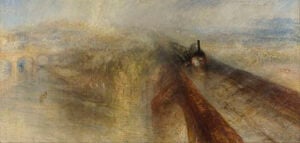
Landscape painting: a journey through the genre’s leading figures, from Giotto to the Macchiaioli
Symbolic, realistic, evocative: over the centuries, landscapes have taken on different meanings depending on the historical period, artistic movement, and each artist’s interpretation. Here, we will retrace its evolution by looking at some of the most significant milestones, from its early days right up to the threshold of Impressionism.
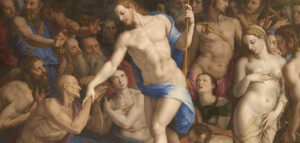
Bronzino’s works in Florence: a guide to discovering a Mannerist genius
An artist and a literary figure, Agnolo Bronzino (1503 – 1572) was one of the most versatile and prolific creators of the Florentine Mannerist period, and for this was greatly praised even by his contemporaries. As the official painter at the court of Cosimo I de’ Medici, he portrayed the family and created frescoes and paintings for numerous Medici residences. This position also ensured him the favor of the city’s nobility and wealthy merchants, who in turn became his major patrons.
He lived most of his life in Florence, where several of his most iconic works are preserved today. We have chosen five that stand out for their painterly mastery and renown – let’s discover them together!
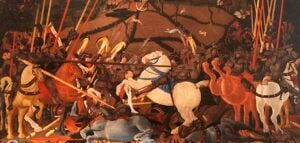
The Battaglia di San Romano by Paolo Uccello, between geometry and bold perspectives
It happens almost every day. Someone, while visiting the Uffizi, finds themselves spellbound before the Battaglia di San Romano by Paolo Uccello – not only because it’s the first non-religious subject in the Galleria’s display, but also for its strikingly unusual appearance. Its colors, composition, and style stand apart from everything around it. Indeed, it’s one of the most accomplished works by that curious and singular personality that was Paolo Uccello. Driven by “whims” and “oddities” (as Vasari1 says), he managed to unite mathematical precision with a sense of fantasy, narrating a real historical event through images.
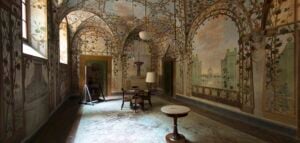
Hidden treasures of Florence: 5 lesser-known museums worth visiting
Renowned worldwide for its unparalleled artistic heritage, Florence abounds with so-called “lesser-known” museums – though that’s simply a technical label and in no way a reflection of their worth.
In this article, we’ve selected five often overlooked gems, typically absent from the usual tourist itineraries, yet brimming with unique treasures, curiosities, and personal stories. Let’s explore them together.
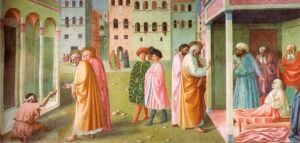
An example of a Medieval Florentine house: curiosities of Palazzo Davanzati
If, while strolling through the narrow streets of Florence’s historic center, you’ve ever wondered what it was like to live during the time of the guelfi and ghibellini or the Renaissance, then you must not miss a visit to Palazzo Davanzati on the ancient Via di Porta Rossa. This authentic 14th century residence, which has remained almost intact, still preserves traces of the families that inhabited it over the centuries and houses an exceptional Museo d’arte e artigianato. Let’s discover it together.
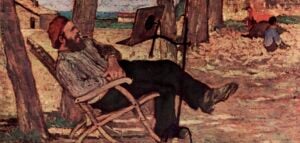
The Macchiaioli adventure and their unforgettable works
When, on November 3, 1861, a journalist from the Gazzetta del Popolo used the term “Macchiaioli” for the first time, he could hardly have imagined that this derogatory epithet would become the official name of the movement that had emerged in Florence only a few years earlier and later became famous throughout Italy.
The experience of the Macchiaioli unfolded in a short time, but it was enough to make it one of the most interesting and revolutionary movements in the European panorama.
Let’s relive that golden era together with some of the works and figures that made it famous.
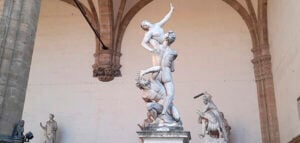
The Ratto delle Sabine by Giambologna, the pinnacle of Mannerism in sculpture
Under the right arch of the monumental open-air museum that is the Loggia dei Lanzi in Florence stands a sculptural group of unparalleled dynamism and expressive intensity. Created in marble in 1582, the Ratto delle Sabine by Giambologna still amazes today with its colossal dimensions and bold composition: three nude bodies intertwined in a scene filled with violence and sensuality.
An eloquent work born from the ingenuity and ambition of one of the protagonists of Mannerism – let’s unveil its history and ambition together.
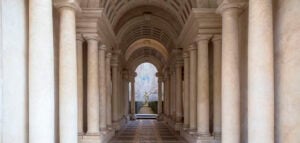
Baroque Rome: an itinerary to discover 17th century architecture between Bernini and Borromini
If Florence is the capital of the Renaissance, Rome is certainly the homeland of Italian Baroque: it is here that, starting from 1630, some of the most successful works of this incredible era were created. An era marked by the search for a new artistic language capable of responding to the communicative needs of the Catholic Church, intent on reaffirming its influence over the faithful after the Lutheran Reformation.
In this dense cultural landscape, two figures stand out for their skill and fame: Gian Lorenzo Bernini and Francesco Borromini. Divided by a bitter and irreconcilable rivalry, they are the main protagonists of 17th century architectural innovation and shaped much of Baroque Rome during this period.
In this five-step walk, we explore some of their most representative buildings, witnesses to their lively antagonism.
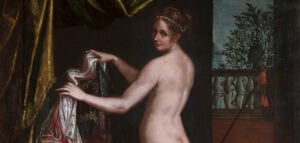
Women artists in the 16th century: female art before Artemisia Gentileschi
Isabella d’Este, Elizabeth I of England, Isabella I of Castile… Retracing the history of the 16th century, we encounter many powerful and strong-willed women known for their decisive roles in the political and strategic events of Europe at the time.
This is not the case for the women artists of the Renaissance: figures who, with rare exceptions, remained excluded from the main stage, victims of the conventions of the time or unfortunate personal circumstances.
Fortunately, thanks to their character and great talent, some female artists defied prejudices and difficulties to emerge in a predominantly male society.

Maestà by Simone Martini, a leading work of Gothic painting in Italy
In our guide to museums to visit in Siena, the Museo Civico is certainly not missing, which houses – among others – the marvelous Maestà by Simone Martini. An imposing fresco that surprises visitors not only for its size but also for the uniqueness of its style and message. An emblem of Italian Gothic painting, the Maestà stands out for the innovations it introduces: let’s explore them together.
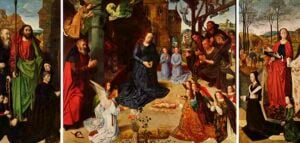
3 artists to illustrate the style and characteristics of 15th century Flemish painting
If there is a period in the history of Western art characterized by a profound and widespread revitalization of the arts, it is certainly the 15th century. During this century, we witnessed an intense succession of both technical and formal innovations, based on a new ideological framework, then uniquely interpreted in different European areas. One of the most prolific is Flanders, which from the 15th century onwards became the cradle of a defined and recognizable style: what is today known as Flemish painting. Let’s explore its salient features and main protagonists.
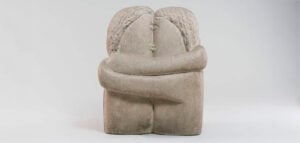
The kiss in art: a love story in 10 works
How much can a kiss convey? And how many forms of love can it express? When you think about it, such a simple and human gesture hides a great variety of meanings, so it’s natural to find it in art, represented in countless ways and styles.
To showcase the versatility of this subject, we’ve chosen ten kisses that illustrate just as many types of love: from the passionate to the allegorical.
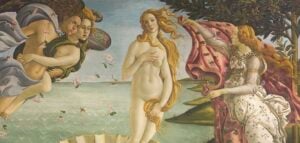
Venere by Botticelli: beauty and renaissance symbolism
It’s impossible not to know it: the Nascita di Venere (circa 1485, Florence, Uffizi) is one of the most admired and emblematic works of the Italian Renaissance. Yet, what we know today about Sandro Botticelli’s masterpiece is very little compared to the fame that accompanies it.
An aura of mystery indeed surrounds the canvas: the date of execution, patronage, and content are still uncertain. Even the title is imprecise.
But none of this diminishes its charm – on the contrary! Let’s retrace the information we have to try to reconstruct its genesis and meaning.
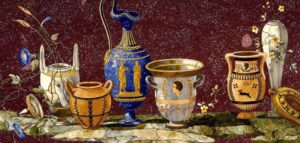
The art of Florentine commesso: origin, technique, and examples of hard stone work
Among the unique works of high Tuscan craftsmanship is the art of hard stones, realized through the creation of pieces in commesso or Florentine mosaic. A tradition that established itself in the 16th century, leaving us enchanting examples of unsurpassed mastery and originality that endure to this day.
But how did this art originate and evolve? And with which techniques? Let’s explore together.
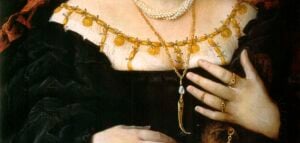
Jewelry in art: curiosities and meanings of painted ornaments
Clergymen, knights, kings, and princes, but also children, noblewomen, saints, and courtesans: many subjects are portrayed wearing or handling jewelry and precious objects. But what are the functions of these painted ornaments? And what are the intentions behind them?
Tracing the history of jewelry in art means simultaneously retracing that of goldsmithing, fashion, culture, and commerce. It’s a fascinating journey that can hardly be contained within the space of a single article.

Leonardo in Florence: his most important works
Among the many honors that Florence can boast, one is being the place where Leonardo Da Vinci took his first steps in the art world, honing his extraordinary talent. Today, the works of Leonardo present in the city allow us to appreciate his evolution. All preserved in the Gallerie degli Uffizi, they are among the masterpieces that best testify to the path taken by the great Tuscan Master, from his early abilities to his acclaimed genius.
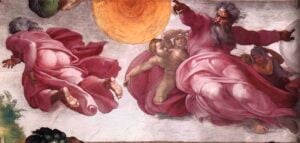
Gestures in Renaissance art: meanings and interpretations of non-verbal communication
In his essay “the gesture in art,” André Chastel warns readers about an unconscious mechanism that occurs whenever we encounter a painting with human figures. If the subject or scene depicted is familiar to us, then the gestures represented seem simple to understand; but when we do not know them, those same gestures become one of the privileged tools for deciphering the theme of the work.
Understanding the meaning of the most common gestures in Renaissance art can provide a new key to interpretation, even for works that are already well-known and seemingly obvious.
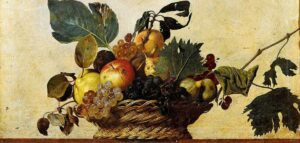
Still life: history and characteristics
Few things can evoke contrasting feelings like still life, especially older ones: some are passionate about it, while others consider it a minor genre. To better understand its importance and charm, let’s retrace its history and evolution, focusing particularly on the 17th century, to which some of the most famous still lifes belong.
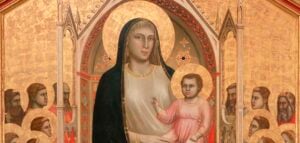
The Maestà di Ognissanti: Giotto’s naturalism at the Uffizi
Entering the Sala delle Maestà at the Uffizi in Florence, one cannot help but be struck by the imposing works that occupy the walls. The essential arrangement allows one to fully appreciate, without distractions, the three panels by Duccio da Buoninsegna (Madonna Rucellai, 1285), Cimabue (Maestà di Santa Trinita, 1290-1300), and Giotto (Maestà di Ognissanti, 1305-1310).
It is the latter, prominently displayed on the central wall, that first welcomes the visitor and stands out significantly – even to less expert eyes – from the other two.
We focus here on the Maestà by Giotto to understand its origin, meaning, and exhibition history.
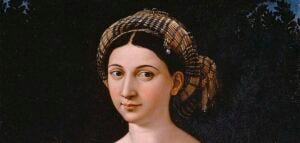
Iconic faces: 5 memorable portraits by Raffaello
Historically, portraits were the prerogative of the nobility until the Renaissance, when a new social class, the mercantile class, emerged, capable of commissioning works and portraits from the great artists of the time. This genre thus spread significantly. Of Raffaello, one of the most renowned artists, we have numerous testimonies today: 5 of his most famous portraits prove it.
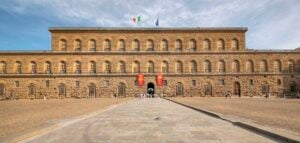
What to see at Palazzo Pitti: an intriguing journey through art and history
Palazzo Pitti is not just the largest of the Florentine palaces; it is also one of the city’s most stimulating locations. Housing five museums spread across its three floors, it boasts artistic treasures and ancient artifacts of diverse origins and priceless value. Through its numerous collections, visitors can trace the key stages of art and culture history, from the Renaissance to the contemporary era: here’s what to see at Palazzo Pitti and the artworks you shouldn’t miss.
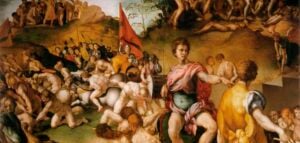
Navigating through styles, terms, and authors: a brief guide to modern art
Navigating through movements, terms, and artists can be complicated, especially when dealing with periods far removed from our own. This is also the case with modern art. Adding to the complexity is the fact that, contrary to common belief, modern art does not coincide with the era commonly defined as modern and contemporary (starting from the late 19th century). Instead, it covers the period from the second half of the 15th century onward.
And it is this period that we address in our brief guide to modern art styles, focusing particularly on Italy.

Through the artist’s eyes: the self-portrait in the Renaissance
Today, we highly value the self-portrait and almost take its existence for granted, but this was not always the case. Like other genres, it has evolved over time. The seeds of this particular artistic category were sown during the Renaissance, an era of great cultural renewal that brought the self-portrait into the limelight in new forms that are still admired today.
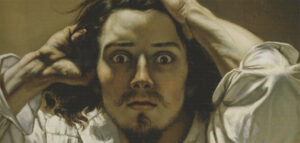
Stendhal syndrome: when art “goes to your head”
“An overwhelming, hallucinatory beauty”, “so beautiful it hurts”: there are several expressions like these or similar in common language. In these sayings, the aesthetic aspect of something or someone seems to have an almost harmful effect on the viewer. Sure, these are hyperbolic phrases, but there is a phenomenon that is not far from what they describe: Stendhal syndrome.
Let’s see what it is about.
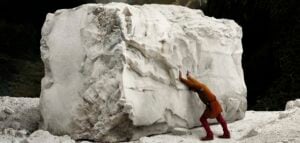
Cinema and art: 10 iconic movies to watch and rewatch
What kind of character did Michelangelo have? What is Van Gogh’s story? And how did Pollock achieve success? Movies often reveal little-known aspects or events and offer new interpretations of the personalities and lives of even the most famous artists. The relationship between cinema and art is long and prolific: in this article, we have selected 10 titles that should be in the filmography of any enthusiast of the genre.
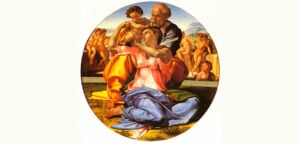
Tondo Doni by Michelangelo: history and insights into a revolutionary painting
An unparalleled work, the Tondo Doni by Michelangelo represents a unique piece not only in art history but also within the artist’s body of work. The painting, already an exception in Michelangelo’s Florentine experience, is the only completed piece on a movable support unanimously recognized as his by critics.
Let’s explore what this “supreme gem of the Uffizi in Florence” represents.
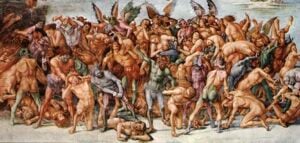
The Devil in art: representations and symbolism through the centuries
The Devil has always assumed multiple forms in art, influenced by different traditions and cultural references, even among artists of the same era. The evolution of this essential figure (Evil opposing Good) is multifaceted and not always consistent.
In this article, we will analyze some of the prominent and easily recognizable traits of the Devil, concluding with a captivating and convincing interpretation.
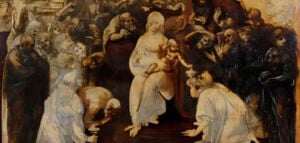
Adoration of the Magi: a journey into Leonardo’s magnificent work
A common fate links all the surviving works of Leonardo: none, it seems, were completed. The most striking example is the Adorazione dei Magi, begun in the late 15th century and never finished.
Recently subjected to a masterful restoration, this masterpiece has much to tell us.

Give art to children: our shop’s selection
Art and childhood? A perfect combination, even when it comes to gifts! Games, books, and objects can help young ones learn about and recognize works and artists, memorize dates and historical facts, discover past lifestyles and diverse cultures, all while having fun. It’s a stimulus for learning and creativity.
Our shop offers many gift ideas for those who want to encourage their children and teens to love art.
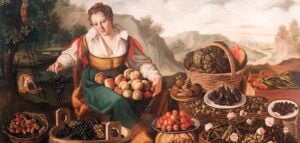
Food in the Cinquecento art and beyond: allegories, genres, and taste
How is food depicted in art? And with what meanings? What stories does it tell?
It is certainly not possible to exhaust such a rich subject in a single article, however, let’s try to retrace together the main representations of food in art, with, but not exclusive, attention to the Cinquecento.
-
White T-Shirt, Tote Bag and Perpetua set
€42,50€41,23 -
White Medusa T-Shirt
€29,00 -
Venus Set – T-Shirt, Tote Bag And Pins
€47,00€44,18
-
White T-Shirt, Tote Bag and Perpetua set
€42,50€41,23 -
White Medusa T-Shirt
€29,00




